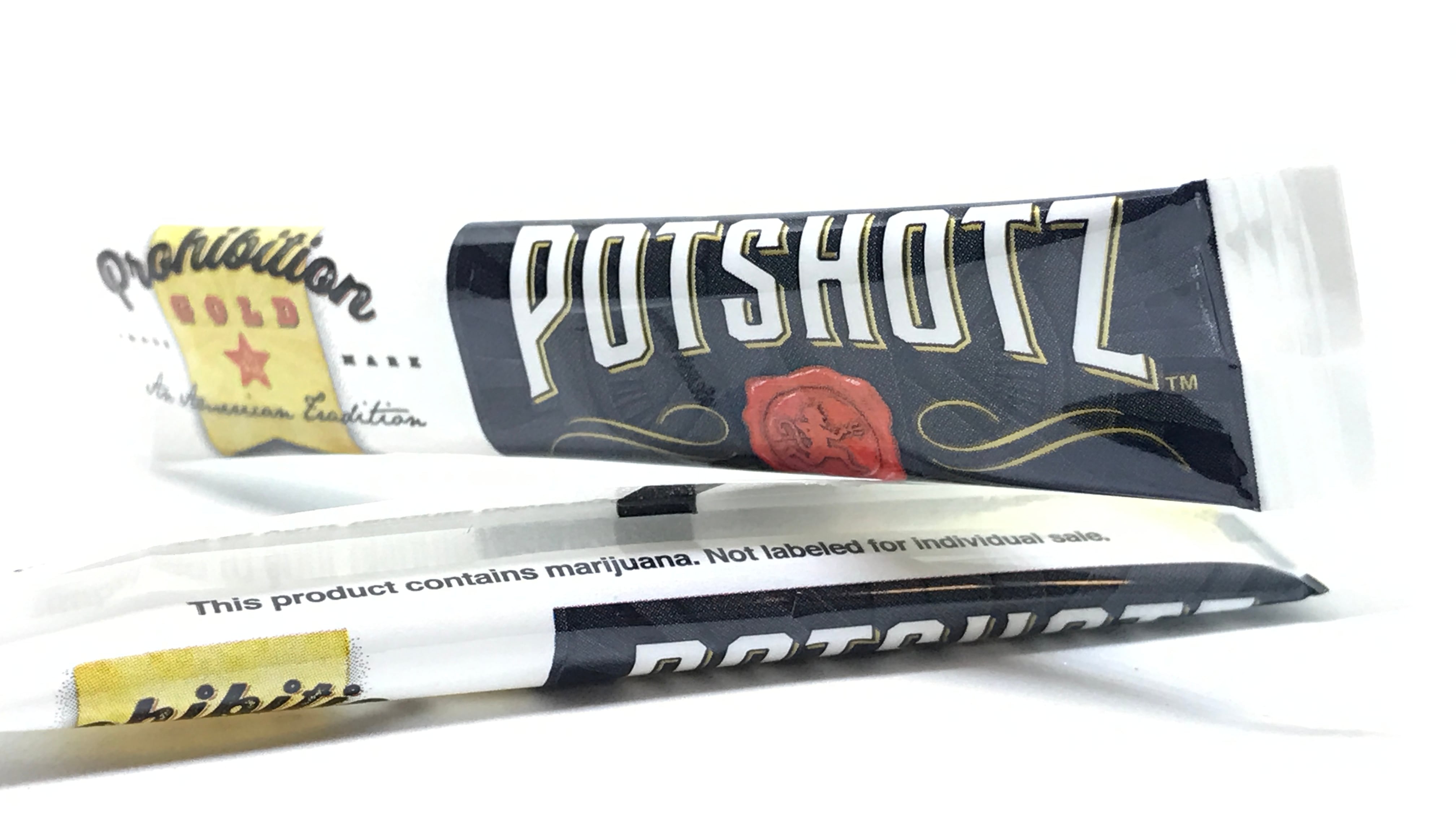A woman holds a martini glass between her fingertips, her skin aglow in the camera's flash, the edges of her evening dress and matching jet-black hair lost against the dim, cocktail-lounge light.
"Devilishly Good Fun," reads the distressed saloon lettering to her left—words made official with a wax seal of a devil wielding a pitchfork.
Though these branding elements read like a Fireball ad, they're the front-and-center web presence of Washington-based cannabis edibles manufacturer Prohibition Gold.
Prohibition Gold, which manufactures packets of powdered, dissolvable THC—Potshotz for drinks, Topshotz for foods—is making it easier than ever to infuse your everyday vittles with marijuana's most common, psychoactive cannabinoid.
It's as simple as tearing open a little plastic packet, pouring the off-white powder into your drink or atop a plate of food, and waiting a few minutes for the "marijuana mixer" to dissolve.
"We want you to be able to infuse just about any type of food so the options that await are endless," reads the Prohibition Gold website. "Now you become your own infusion chef. You decide when, where, and what you want to infuse."
At 10 mg of THC per single-serving pouch—sold at Washington dispensaries in boxes of ten packs for $25—these dissolvables offer a manageable marijuana experience, ideal for cautious consumers seeking a low-key high.
We tried out Prohibition Gold's futuristic beverage enhancer, Potshotz, and were impressed with what we found.
Added to your drink of choice, the powder dissolves within a minute or so, fizzing atop its liquid host until the concoction is ready to go.
Once dissolved into a beverage, Potshotz impart a bit of a chemical taste, but it's a bitterness that's easily masked by a flavored beverage. We thought Gatorade made for the best pairing, though LaCroix held up just fine.
We also noticed that Potshotz tend to kick in faster than edibles that need to be chewed and digested—an observation corroborated by Prohibition Gold's website, which claims that their product "diffuses THC into the drink, coating your mouth and throat so it starts working while other edibles are being digested."
Over three different trials, the effects were felt within 30 minutes, peaking at a mellow, functional high before dissipating after a few hours—a gentle intoxication that comes and goes with ease.
We found the convenience, flexibility, and stealth to be unparalleled, and there's no doubt that newcomers and enthusiasts alike will be attracted to the opportunity to whip up their own quick and easy "special" spaghetti or "magic" margarita.
But more than convenience, Prohibition Gold's line of dissolvables achieves that which cannabis industry investors have sought for some time: these tidy packets of THC decouple weed from the blunts and bongs and junk food edibles that have for decades characterized the lazy pothead and the ineffectual stoner—stigmatized images that deter less adventurous types from giving cannabis a fair chance.
For the cannabis curious, Prohibition Gold presents their line of products as a cultural alternative, a party at the end of prohibition's rainbow populated by pretty, clean-cut people having fun nights out.
And while there's nothing wrong with framing weed use in cultural contexts that are more approachable to more people, Prohibition Gold's branding takes things a step further—framing modern day marijuana as something akin to drinking, while overlooking the swaths of US citizens whose lives are negatively impacted by present-day cannabis policy.
Rather than depict reality—prisons packed disproportionately with people of color, many serving time for nonviolent drug crimes—we're shown 90-year-old photos of defiant good old boys putting back bootleg spirits in cramped speakeasies.
By proximity, America's War On Drugs is likened to a folksy, underground pal-about where everyone knows your name—a chopped and screwed version of history that lifts cannabis out of cannabis culture, ferries it over a troubling contemporary political landscape, and plops it down in the narrative of alcohol consumption.
This isn't to say Prohibition Gold's branding completely ignores the history of criminalized cannabis—they've got a section about the political and racial trickery used in the 1930s to influence US marijuana policy—but far more screen space is given to upbeat tales of rum runners and photos of contemporary drinking culture.
Of course, it's not Prohibition Gold's responsibility to fight the good fight—and their product innovations are a welcome step forward—but their selective portrayal of cannabis prohibition and their choice to use inaccurate historical comparisons to re-culturize weed for the sake of commerce feels a bit grabby.
Nonetheless, there's something great about the freedom to easily transform beloved foods and drinks into cannabis treats, and we hope similar products will make their way to the Oregon market soon.
